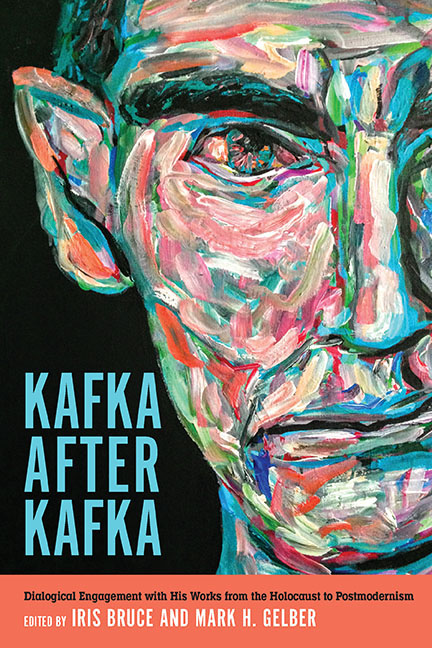Book contents
- Frontmatter
- Contents
- Acknowledgments
- Introduction
- Part I Philosophical and Literary Hermeneutics after the Holocaust
- 1 Tradition of Loss: Werner Kraft on Franz Kafka
- 2 A Brave New Word: Hannah Arendt's Postwar Reading of Kafka
- 3 Binding Words: Sarah Kofman, Maurice Blanchot, Franz Kafka, and the Holocaust
- 4 Kafka as the Exemplary Subject of Recent Dominant Critical Approaches
- Part II Kafka in Israeli Cultural Space
- Part III Kafka from Modernism to Postmodernism
- Notes on the Contributors
- Index
2 - A Brave New Word: Hannah Arendt's Postwar Reading of Kafka
from Part I - Philosophical and Literary Hermeneutics after the Holocaust
Published online by Cambridge University Press: 12 April 2019
- Frontmatter
- Contents
- Acknowledgments
- Introduction
- Part I Philosophical and Literary Hermeneutics after the Holocaust
- 1 Tradition of Loss: Werner Kraft on Franz Kafka
- 2 A Brave New Word: Hannah Arendt's Postwar Reading of Kafka
- 3 Binding Words: Sarah Kofman, Maurice Blanchot, Franz Kafka, and the Holocaust
- 4 Kafka as the Exemplary Subject of Recent Dominant Critical Approaches
- Part II Kafka in Israeli Cultural Space
- Part III Kafka from Modernism to Postmodernism
- Notes on the Contributors
- Index
Summary
THE FACT THAT Hannah Arendt fled Germany in 1933 is fairly well known. It serves as a focal point of her biography and it powerfully represents the way in which Germany betrayed its own citizens who were Jewish. Arendt was both an émigré and a Jew. She was born in 1906 to acculturated and well-to-do parents in Hannover and grew up in Königsberg, where she quickly stood out as an exceptional student. Arendt went on to study philosophy and theology at the University of Marburg with Martin Heidegger and completed her dissertation under Karl Jaspers in 1928. One could have easily imagined her then as a potential representative of a new generation of German philosophers and of German-Jewish women. This, of course, never came to be. After a brush with the Gestapo in Berlin in 1933, Arendt realized that her life was in danger. She immigrated the same year to Paris, where she worked for the Zionist Youth-Immigration Organization (Aliyat Ha'Noar). Then, in 1941, she fled again, this time to New York, where she gradually gained recognition as a scholar, essayist, and public intellectual. Hannah Arendt is thus known today mostly as a German-Jewish émigré who had to start over in the United States after she was forced to escape Germany in order to save her life.
Those familiar with Arendt's biography are aware that she visited West Germany many times after the war ended and that she was often extremely critical of it. Arendt came to West Germany for the first time in 1949 on behalf of “Jewish Cultural Reconstruction, Inc.” to help organize the shipment of heirless Jewish books and other items from Germany to Jewish communities around the world. Shortly after this visit, in 1950, she published a critical report about Germany's inability and unwillingness to come to terms with its immediate past. “Nowhere is this nightmare of destruction and horror less felt and less talked about,” Arendt writes to her American audience, “as in Germany itself. A lack of response is evident everywhere, and it is difficult to say whether this signifies a half-conscious decision to yield to grief or a genuine inability to feel.”
- Type
- Chapter
- Information
- Kafka after KafkaDialogic Engagement with his Works from the Holocaust to Postmodernism, pp. 29 - 44Publisher: Boydell & BrewerPrint publication year: 2019



